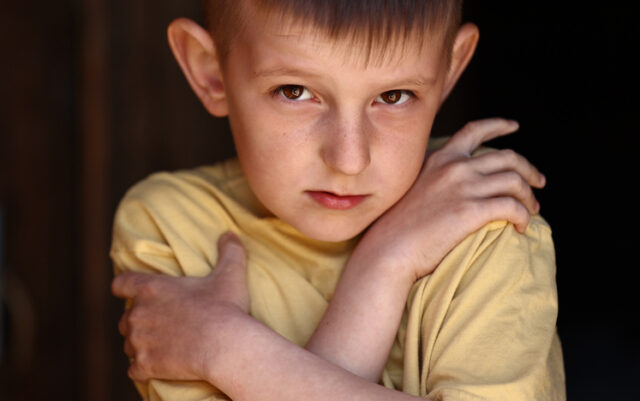Infidelity doesn’t have a single root cause, but there are some experiences we can have while growing up that can shape our behaviours in this department.

This doesn’t mean that these experiences guarantee someone will cheat, but they can create vulnerabilities and patterns that increase the likelihood. This doesn’t excuse their betrayal, but it might shed a bit more light on why it happens.
1. Having a parent who cheated

Kids who see their parents cheat might think it’s okay to cheat themselves when they’re older. They might not believe that love means being faithful, and they could think it’s normal to look for love or physical intimacy outside of their main relationship. It’s like they’re given a messed-up idea of what love is supposed to be, where there are no rules and loyalty doesn’t matter.
2. Experiencing emotional neglect or abandonment in childhood

When kids don’t get the love and attention they need, they might grow up feeling insecure and scared of being left alone. This can make them look for love and acceptance in all the wrong places when they’re older, trying to fill the gap from their childhood. They might really want the attention and praise they missed out on as kids, even if it means doing things they shouldn’t.
3. Being raised in an environment where dishonesty and secrecy were the norm

If children grow up around lies and secrets, they might not learn to be truthful and honest. They might think it’s okay to trick people to protect themselves or get what they want. This can make it easier for them to cheat in their own relationships, as they might not see it as wrong.
4. Having parents who put their own needs before their children’s

Children who felt ignored or unimportant growing up might start to think they deserve special treatment and that their needs are always the most important. This can make them less caring about their partner’s feelings, and they might think it’s okay to cheat if it makes them happy.
5. Growing up with a lack of clear boundaries or consequences for inappropriate behaviour

If children aren’t taught about boundaries or told off when they do something wrong, they might find it hard to understand and respect the boundaries in their relationships when they’re older. They might see cheating as no big deal, or a way to see how much their partner will put up with.
6. Experiencing physical, emotional, or sexual abuse in childhood

Trauma can leave deep scars. People who’ve been through abuse might find it hard to trust anyone, be close to them, or even feel good about themselves. This can make them more likely to look for love and acceptance outside their main relationship. They might also cheat as a way to feel more in control or powerful.
7. Being raised with rigid or unrealistic expectations about relationships and love

If kids are taught that relationships should be perfect and without any arguments, they might not know how to deal with the normal ups and downs of being with someone. They might see any little problem as a reason to look for someone else who seems “better” or more exciting. It’s important to remember that all relationships need effort and compromise to work.
8. Having a parent who always criticised their child’s appearance or personality

Kids who grow up feeling like they’re not good enough or not worth loving might look for praise and acceptance from other people. They might be easily swayed by attention and compliments, even if it means hurting their main relationship. Building up their confidence and self-worth is really important for them to have good and happy relationships in the future.
9. Growing up in a culture or community that promotes gender inequality or objectification

If kids see or hear messages that put women down or treat them like objects, they might start to believe those harmful things themselves. This can make them disrespectful towards their partners and more likely to cheat. It’s really important to challenge these ideas and teach everyone to treat each other equally and with respect.
10. Having a history of impulsive or risk-taking behaviour

People who act without thinking or love the thrill of something new might be more likely to cheat without thinking about the consequences. They might be tempted by the excitement of a new relationship, even if it means messing up the one they’re already in. Learning to control their impulses and think before they act can help them avoid cheating.
11. Struggling with addiction or substance abuse

Addiction can cloud your judgement and make it hard to resist temptation or think about the long-term consequences of your actions. People struggling with addiction might be more likely to do risky things, including cheating. Getting help for addiction is really important for both your own well-being and having healthy relationships.
12. Having a fear of intimacy or commitment
 Source: Unsplash
Source: Unsplash Some people might be scared of getting too close to anyone or settling down in a long-term relationship. They might cheat as a way to create distance or mess things up, even if they do care about their partner. It’s important to deal with these underlying fears and insecurities if they want to build healthy and happy relationships.
13. Feeling unappreciated or undervalued in their current relationship
 Source: Unsplash
Source: Unsplash When people feel like they’re not appreciated or their needs aren’t being met, they might be more likely to look for validation and appreciation somewhere else. They might turn to infidelity as a way to feel desired or important. Open communication and mutual respect are non-negotiable for maintaining a healthy and fulfilling relationship.
14. Experiencing a major life transition or crisis
 Source: Unsplash
Source: Unsplash Big life events, like losing your job, becoming ill, or someone you love dying, can cause a lot of emotional upset and make you feel vulnerable. People might look for comfort or distraction in a new relationship, even if it means cheating on their partner. During these tough times, it’s important to find healthy ways to cope and get support from friends, family, or professionals.
15. Having a partner who is also unfaithful or emotionally unavailable

If someone feels like their partner’s already cheating or being distant, they might think it’s okay to look for connection with someone else. But, it’s important to talk about the problems in the relationship and be honest with each other before doing something like that.
16. Struggling with low self-esteem or a lack of self-worth

People who struggle with low self-esteem might look for validation and approval from outside sources, including having affairs. They might not believe they deserve love or commitment, and they might even use infidelity as a way to ruin their own relationships. Building up their confidence and developing a strong sense of self-worth is crucial for forming healthy and fulfilling connections.
17. Having a personality disorder or other mental health condition

Some mental health conditions, like borderline personality disorder or narcissistic personality disorder, can make someone more likely to cheat. These conditions can make it hard for someone to control their emotions, respect boundaries, and understand how others feel. Getting professional help for these conditions is really important for both their own well-being and having healthy relationships.




